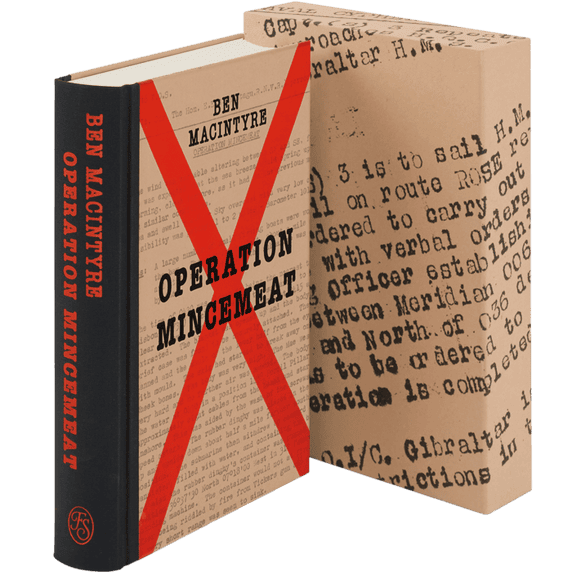
Ben Macintyre’s number-one bestseller Operation Mincemeat is the definitive account of the Second World War’s greatest military deception: a daring hoax that fooled Hitler and changed the course of history.
The Rise and Downfall of Prussia, 1600–1947
An illustrated Folio Society edition of Christopher Clark’s magisterial history of Prussia from 1600 to the aftermath of the Second World War – winner of awards including the Wolfson History Prize.
For many Germans, ‘Prussia’ remains synonymous with everything repellent in German history: militarism, conquest, arrogance and illiberality.
As Europe lay in ruins after the Second World War, Prussia abruptly ceased to exist – wiped off the map by the victorious Allies as the prime ‘bearer of militarism and reaction in Germany’. In this masterful study, Christopher Clark argues for a more nuanced appraisal of the 350-year-old state that perished, unmourned, in the ashes of the Third Reich.
This two-volume Folio edition is beautifully presented and lavishly illustrated. Maps within the text clearly illustrate territorial changes, and each volume has 32 pages of carefully selected colour and black-and-white images – from paintings of Prussian royalty to political leaflets and vivid war photography. Its exquisite bindings are the work of eminent graphic artist and Folio favourite Neil Gower, with designs featuring the Order of the Black Eagle, the Pickelhaube (pointed helmet) and the Prussian coat of arms.
Bound in blocked cloth
Set in Walbaum
Vol 1: 392 pages, Vol 2: 440 pages
64 pages of colour plates
14 integrated maps across both volumes
Blocked slipcase
10˝ x 6¾˝
The truth is that Prussia was a European state long before it became a German one. Germany was not Prussia’s fulfilment ... but its undoing.
Iron Kingdom deftly captures the many contradictions of Prussia, a medieval backwater that became a major European power and the force behind the mighty German empire. Clark argues that its military power was rooted in vulnerability – ‘Brandenburg-Prussia repeatedly stood on the brink of political extinction’ – and was balanced by enlightenment values that produced great works of art, religious tolerance and a modern civil administration.
With a cast of brilliant leaders, from the Hohenzollerns of Brandenburg to Frederick the Great and Bismarck, it is a story of hard-fought victories and ruinous defeats on the battlefield, of territorial gains punctuated by times of stagnation, of dynastic marriages and of treacherous alliances. Above all, Clark’s narrative rebuts the idea that Prussian arrogance inevitably pushed Germany down its own special path (Sonderweg) to Hitler and the horrors of National Socialism.
A bestseller and a critically acclaimed work of history, Iron Kingdom is gripping and readable. Since its first publication, it has been widely lauded for looking beyond the clichéd representations of warlike Prussia to uncover the complex legacy of what was also a cultured, progressive and tolerant state.
The book cemented Christopher Clark’s reputation as a great communicator as well as a leading scholar. After winning the 2007 Wolfson History Prize, Iron Kingdom made Clark the youngest ever recipient of the German Historians’ Prize, and earned him an invitation to brief the President of Germany on the issues that it raised.
Christopher Clark received his PhD at the University of Cambridge, having been a member of Pembroke College, Cambridge, from 1987 to 1991, and is currently Regius Professor of History at St Catharine’s College, Cambridge. His publications include a study of Christian–Jewish relations in Prussia, The Politics of Conversion (1995), the critical biography Kaiser Wilhelm II (2000) and The Sleepwalkers: How Europe Went to War in 1914 (2012). He was knighted in 2015 for services to Anglo-German relations and was awarded the Officer’s Cross of the Order of Merit of the Federal Republic of Germany in 2019.
